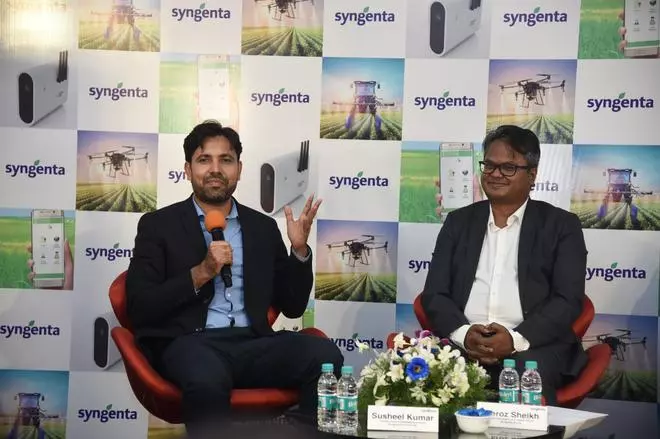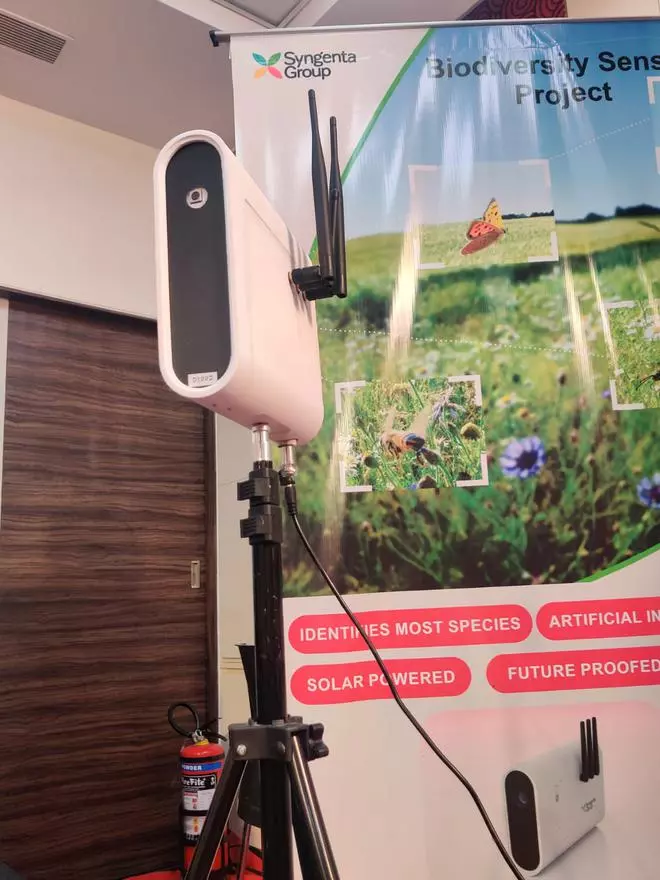Syngenta, a global agri-business major, on Friday (July 15) launched a unique biodiversity sensor project, claimed to be the first in the world, in collaboration with the Indian Institute of Technology, Ropar, Punjab, (IIT-R), to study the behaviour of insects around farms, particularly bees and butterflies.
Addressing the media at an event to launch the project and also flag off the firm’s Drone Yatra which will cover 10,000 km across the country, Syngenta India country head and Managing Director Susheel Kumar said the project will monitor to identify and quantify insect life in an around farms to give real-time data on biodiversity through a sensor.
The project includes a centralised biodiversity data repository that can be shared and tracked. The biodiversity monitoring will be done by a modem-like sensor that has a camera to capture real-time images of bees and butterflies flying across it on a farm where it is deployed. An artificial intelligence-based algorithm will identify the species and the number of times it flies past the sensor.
Open source data
“It will identify how many such insects and their type and record them as data,” said Feroz Sheikh, Chief Information Officer and Digital Officer, Syngenta Group. The data will be open source and free for anyone to access across the world.

(From left) Syngenta India country head and Managing Director Susheel Kumar with Feroz Sheikh, Chief Information Officer and Digital Officer, Syngenta Group
Kumar said the blueprint of the sensor too will be shared for the development of similar ones. “Anyone can see the data and blueprint. Agriculturists and agronomists can use it for improving biodiversity,” he said.
Syngenta has embarked on the project in collaboration with IIT-R since very little data is available on the changes to biodiversity.
“Eventually, we hope to broaden this technology to detect other habitats as well. The prototype has been operational since March. The sensor has been honed and refined to develop artificial intelligence. In 2023, we hope the first sensor-network pilot projects will be implemented in select countries,” Sheikh said.
Saving farm-friendly insects
The sensor will be run on solar power and machine learning will also be used in capturing data. On the collaboration with IIT-R, he said Syngenta will pursue the development and commercialisation of agriculture and water solutions to solve global and local problems.

The biodiversity monitoring will be done by a modem-like sensor
Pushpendra P Singh, Associate Dean (R&D), IIT-R, said the sensor will function like a digital entomologist. “It will help understand insect behaviour so that farmers can avoid spraying insecticide or pesticide at a particular time of the year when it could affect farm-friendly insects,” he said.
Launching the “Drone Yatra”, Kumar said after starting from Manchar in Maharashtra, it would then cover Madhya Pradesh, Gujarat, Punjab, Rajasthan, Uttar Pradesh, Bihar, Odisha, Andhra Pradesh, Telangana and Karnataka. In all, it would cover 13 States to create awareness of on drone spraying.
Launch of grower app
He said Syngenta had got Central Insecticide Board (CIB) approval approve to spray an insecticide and a fungicide for paddy, cotton, and soyabean using drones. “We had tested it on 400 acres spraying the insecticide and fungicide using drones and then sought CIB approval,” he said, adding that Syngenta was the first private firm to get the clearance.
The company will use 50 drones this year and later scale up to 5,000 for spraying insecticides. Kumar said Syngenta will soon launch a grower app, which he said would be one of the biggest in the world, providing personalised agro solutions, including weather-based alerts and have chat facility for farmers.
Sheikh said the beta version of the app is being tested, including using satellite-based imagery for crop stress. Once the results of the Beta version are available, Syngenta will upload it for farmers to download for free. “To begin with, 2,50,000 farmers can download it before a million can get access,” he said.
IIT-R’s Singh said the institute was also working with Syngenta on “Ambitech” which will help study temperatures ranging from -40°C to +80°C. “Ambitech” can be set up to measure temperatures, which can then be recorded and converted into PDF files.
A printout of the file can be taken by connecting it to a Bluetooth device. The indigenously developed device, to be available at a competitive price, can help cold chains, dairy, and meat sectors by providing data on the temperature under which the products had been stored.
The author was in Pune at the invitation of Syngenta








Comments
Comments have to be in English, and in full sentences. They cannot be abusive or personal. Please abide by our community guidelines for posting your comments.
We have migrated to a new commenting platform. If you are already a registered user of TheHindu Businessline and logged in, you may continue to engage with our articles. If you do not have an account please register and login to post comments. Users can access their older comments by logging into their accounts on Vuukle.